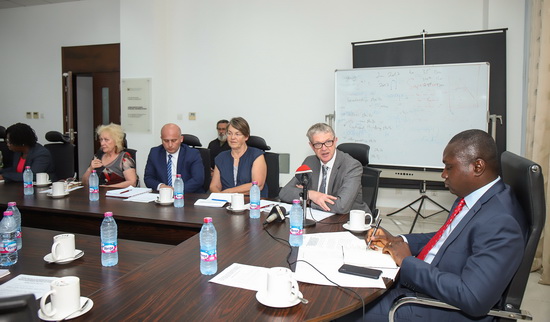
Ghana to establish mechanism for the prevention of torture
Ghana is working on the establishment of a National Preventive Mechanism (NPM) that is expected to be an independent body to liaise with the government and the United Nations Subcommittee on the Prevention of Torture and other Cruel, Inhuman or Degrading Treatment or Punishment (SPT) in the execution of its mandate.
However, while the designation of an existing agency as the NPM must be done by law, the Commission on Human Rights and Administrative Justice (CHRAJ) has indicated its readiness to act as the NPM after the necessary constitutional hurdles have been surmounted and may likely be designated as Ghana’s NPM in the future.
The Deputy Minister of Foreign Affairs and Regional Integration, Mr Charles Owiredu, disclosed this at the opening session of the meeting with the delegation of the United Nations Subcommittee on the Prevention of Torture and other Cruel, Inhuman or Degrading Treatment or Punishment.
He noted that Ghana ratified the Optional Protocol to the Convention against Torture and Other Cruel, Inhuman or Degrading Treatment of Punishment (OPCAT) in 2016.
In accordance with the provisions of the OPCAT, he said the Subcommittee on the Prevention of Torture reserved the right to visit any State Party to the convention, as well as places of the deprivation of liberty of their choosing. This is to ascertain the steps taken to prevent torture from being committed, as well as to ensure that places of the deprivation of liberty and similar settings are livable and conditions are humane, he stressed.
Mr Owiredu observed that Ghana’s accession to the OPCAT entered into force on October 23, 2016 and per Article 17 of the convention, each State Party must maintain, designate or establish one or several independent National Preventive Mechanisms for the prevention of torture at the domestic level, at the latest one year after acceding to the convention.

The deputy minister announced that Ghana would welcome technical assistance for the implementation of the OPCAT, through the Treaty Body Capacity-Building Programme of the Capacity Building and Harmonisation Section of the Human Rights Council and the Treaty Mechanism Division of the Office of the UN High Commissioner for Human Rights.
Delegation
The Chairman of the SPT and Leader of the delegation, Mr Malcolm Evans, explained the nature of the Convention against Torture and other Inhuman or Degrading Treatment or Punishment obligations.
He said the first obligation was manifested in the current visit, which allowed the delegation of the SPT to be able to visit a country of its choice with access to all places where persons were deprived of their liberty across the length and breadth of the country.
Mr Evans noted that they had already visited a place in the country to start work, adding that they would like to receive more concerns on key aspects of the architectural framework of the criminal council system, the current state of the anti-torture legislation and the current plans of the NPM.
He observed that there were other issues of importance and interest to them concerning Ghana’s approach to tackling problems such as overcrowding within the prison system.
The deputy minister said it was in their interest to tackle the already-known problems and it would be beneficial to them to hear more from the Ghanaian delegation about what they considered the main practical challenges, which would be relevant in their work.
He said the delegation was also interested in pensions, most notably in relation to issues in health care, mental health care and matters related to it.

